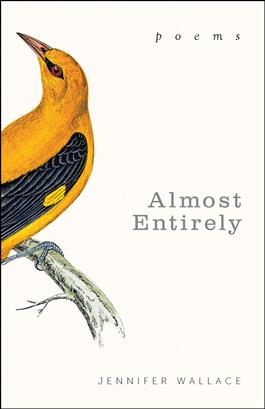 Jennifer Wallace’s Almost Entirely was featured in ImageUpdate. Click here for the full roundup.
Jennifer Wallace’s Almost Entirely was featured in ImageUpdate. Click here for the full roundup.
Referring to her new poetry collection, Jennifer Wallace remarks, “I like the sense of ‘entirely’ modified by ‘almost’…That’s my sense of life in this world.” These short poems limn the course of a mature artistic life and its struggle between faith and doubt, the incarnate and the unseen, love and loss. Almost Entirely, Wallace’s seventh book, examines the search for wholeness, including re-exploration of Wallace’s Christian roots. In the opening section, “The Wind of God” is evoked as it “…moved over the face of the waters.” Yet often, the writer notes, “God has turned my head in the right direction/ yet I haven’t seen the gesture for what it is.” Vision necessitates discernment. Recalling Kierkegaard’s observation that “Christianity is not a consolation/ but a demand,” Wallace observes, “Call me crazy, hardship appeals/…. now the problem of attending it begins.” But attention can be difficult. Of a friend’s murder, the poet writes: “How to feel his death? On the street. / The shots. My friend’s scream.” Even the faith that allows one to bear a “wing giving way” brings “meanings that will shatter me more than this.” Nothing is sentimentalized here. As “I Don’t Like People; Animals, Too, Are an Imposition” relates, our lives daily encompass ordinary trials, like “a mean as a chainsaw bad neighbor.” It is ours to get on with things; the poet “has chores to do: chop wood, fix the wall in my yard.” But luckily, there is also grace’s blinding flash, that occasional release to something else, almost entirely: “resting on its surface with sail or paddle/I am brought beyond my landedness/not until diving under can I know/ its pillowed, dull moss-light…a body is seen at last for what it is:/awash in the eye of God.”
—Ann Conway, Image Update
